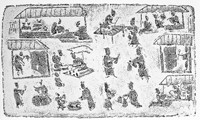1) rural market


农村墟市
1.
The development of Gannan rural markets in Qing Dynasty was the history of its economy and society.
宗族利用其自身势力,或筹建墟场,或向墟市渗透,或控制墟市,反映了客家传统社会双层架构的特点;庙会因其地域性、整合性、经济性和社会性,蕴含着丰富的经济意义和文化意义;习俗对赣南农村墟市经济的运行也有着保障和导向的影响。
2.
Gannan rural markets that live against the background of Hakka culture have seen great changes both as economical and social operation.
赣南农村墟市中的非正式制度在近代社会变迁中 ,有的遭淘汰或受限制 ,有的则演变或延伸。
2) Fairs


墟市
1.
Viewing Guangdong Fairs of Early Qing Dynasty from Drawing of Night Market in Guangzhou Drawn by Lang Shining;
从郎士宁《羊城夜市图》看清初广东墟市
3) rural market


农村市场
1.
Achieving and strengthening the low-cost and prompt strategic expansion of telecom enterprises in the rural market by virtual management;
以虚拟管理实现和巩固电信企业在农村市场的低成本快速战略扩张
2.
Discussion on the extension of the rural market based on logistics chain under the e-commerce environment;
电子商务环境下物流链扩展农村市场的探讨
3.
On the development of rural markets in the Southern and Northern Dynasties and their characteristics;
试论南北朝农村市场的发展及其特点
4) rural market


农村集市
1.
The rural market once is the peasant s backing economy life.


农村集市在我国有着悠久的历史,作为农村商品流通的重要途径,它一度是农民经济生活的依托。
5) the rural market


农村市场
1.
Switching on the rural market:stress the nonessential or the essential?;


启动农村市场:抓末端,还是抓源头?
2.
At the same time, many people have been paying attention to the rural market which has great consumptive potential.
近年来我国经济发展迅速,具有巨大消费潜力的农村市场日益受到各方的重视。
6) countryside market


农村市场
1.
With the opening of retail market to foreign capital,the competition between China and foreign enterprise become more and more fierce,for better development,native retail enterprises turn their eyes on the countryside market.
随着我国的零售市场全面对外资开放,中外零售企业在大城市的竞争日趋激烈,为了求得更好的发展,不少本土零售企业将战略扩张的重点放到了乡镇农村市场。
2.
To solve these problems, we seek the new retail patterns: to adjust the selling spots scientifically and to develop the countryside market; to strenghen the macroscopic adjustment to set up the modern enterpri.
使它走出困境的对策是 :寻求新的零售形式 ,科学布局网点 ,开辟农村市场 ;加强宏观调控 ,建立现代企业制度 ,深化经营管理体制的配套改革 ;依靠自身优势 ,进行营销创新 ;强化企业内部管理 ,全面提高企业素质 ,向管理要效
3.
Now that the town market is in difficulty to invigorate ,we prefer opening up the countryside market despite the trouble it faces.
中国农村市场广阔 ,潜力巨大 ,在目前城镇市场难以启动的情况下 ,农村市场走出困境 ,农村市场的开拓是目前我国扩大内需的关
补充资料:墟市
| 墟市 中国乡村定期集市。商品交换过程中最原始的低级市场。东晋、南朝到隋、唐文献记载中的草市,就是这类低级市场。宋代乡村定期集市有了较为广泛的发展,广大地区仍称这种集市为草市,两广称为墟市,还有的地方称为痎市、村市、山市、野市、子市、早市等。这些乡村集市都有固定的日期。乡村集市是周围村落的农民、小工、小商买卖交换的场所,以自己的农副产品交换农具、日常用品之类,称为赶集或趁墟。在交易之后,一般四散回家,集市上没有居民。随着商品交换的发展,不少乡村集市形成为新的居民点,汇集了行商坐贾,发展成为相当繁荣的贸易点,并上升为镇、县。在经济发达的地区,这些定期的乡村集市构成为商业网。宋政府对乡村集市的发展,不加干预,有时还予以提倡。除岭南墟市宋初一度不征商税之外,广大乡村集市都征收商税。但这些集市的商税被当地富豪“买扑”承包。明清是乡村集市发展、繁荣时期。除岭南地区仍称为墟市外,其他地区多称为市或集。江南地区乡村集市的发展达到了相当可观的规模,除了商品生产及交易外,茶肆酒楼也大量出现,市镇生活的寄生性日渐增大。市之较大繁荣者,往往不在镇之下。由于商品经济的发展,一些市渐渐向专业化转变,某些市还发展为镇,这些分布广泛的市成为仅次于镇的地区性商业中心,并与镇一起初步构成区域性的市镇体系。岭南地区的墟市出现了一些“逐日市”和专业化的墟市。北方地区则以定期集市为主,其繁华程度逊于江南。清代以后,尽管某些市衰落,但总的趋势是仍在发展。墟市仍广泛存在于中国南北各地。
|
说明:补充资料仅用于学习参考,请勿用于其它任何用途。
参考词条
